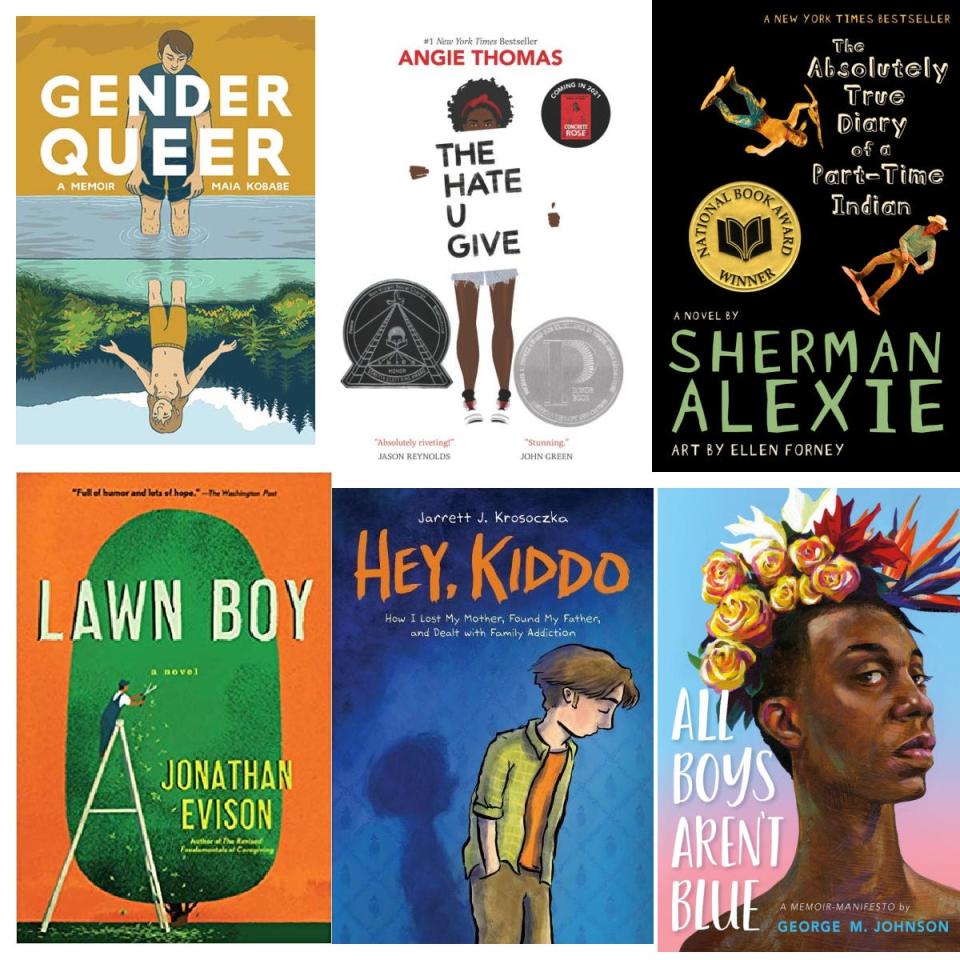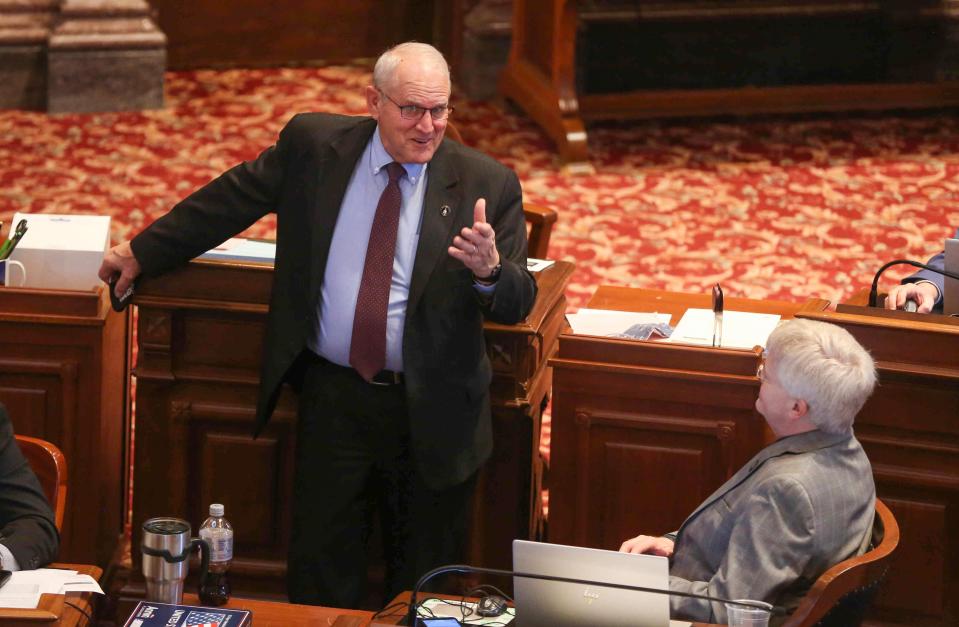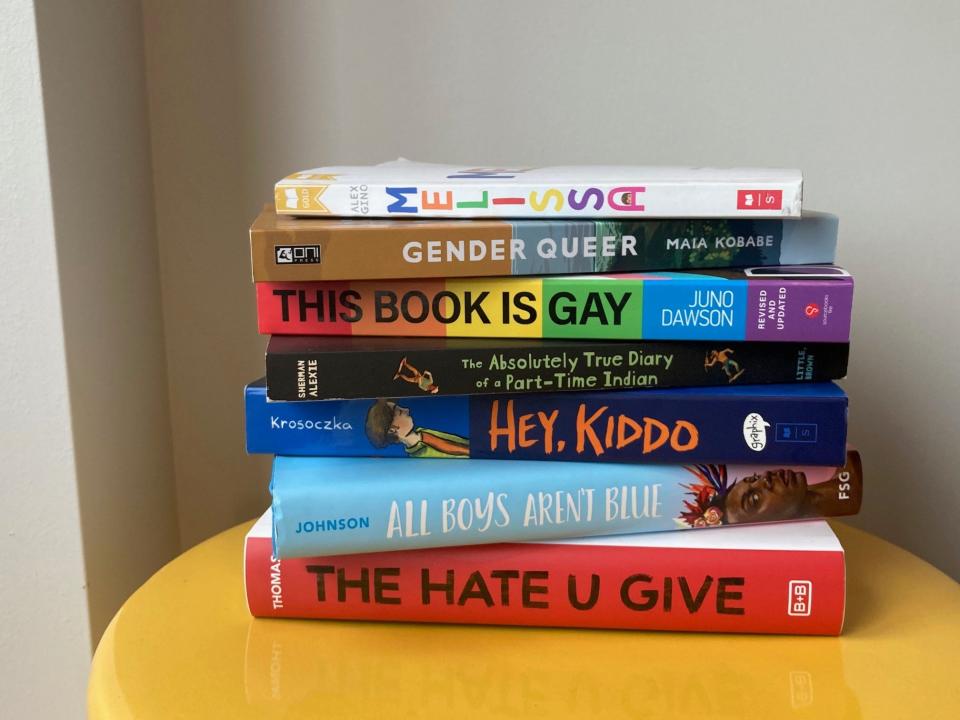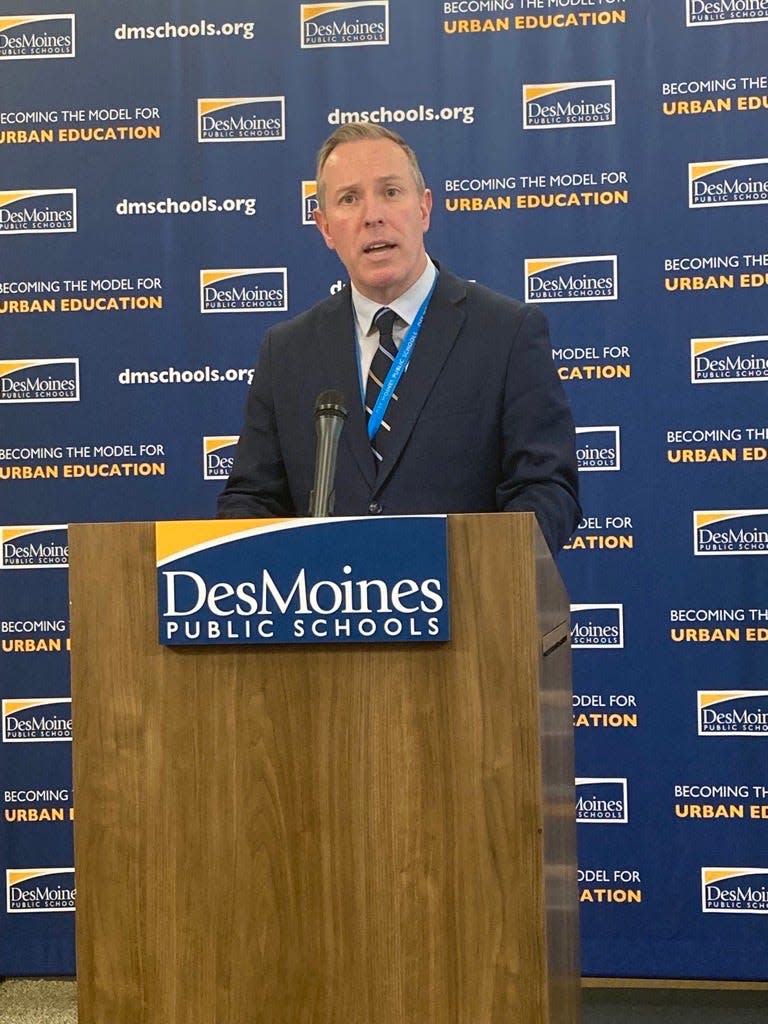Iowa schools are pleading for state guidance on ban on books with sex. Will it come too late?

For weeks now, Superintendent Angela Huseman has been waiting for guidance from the state on how to handle a sweeping new education law that requires the removal of almost every school book in Iowa depicting sex acts.
So far, all she's heard is silence.
Until they get some direction, teachers at her Tri-Center Community School District just north of Omaha won't remove a single book, a frustrated Huseman said.
"Since I won’t jump to change anything until we have guidance, it will be a non-issue," Huseman told the Register about the impact of Senate File 496, the new law banning books describing sex acts.
On Thursday, the Iowa Department of Education finally stepped forward, saying guidance is on the way after initially telling media that districts would need to consult with their local attorneys on how to follow the law.
But with the new school year quickly approaching, some district leaders say the state's instructions might not come soon enough.

"The issue will be if guidance requiring us to make big changes comes out during the year when we have kids in the building, I might have to pull adults that should be working with kids to make sure we are compliant," Huseman said.
The passage of Senate File 496 places Iowa among a growing number of states including Florida, Arkansas, Arizona and Texas that have passed laws restricting books that conservatives contend are inappropriate for students.
Iowa law defines “sex act” with specificity, providing a list of sexual interactions. But Huseman and educators across the state say they are looking to the Iowa Department of Education to provide detailed advice on how to sort through entire libraries of books.
How detailed does a sex scene need to be to meet the threshold? And who will flip through all the books to confirm they are sex-free?
“The problem with this topic is, again, it is so subjective,” Huseman said. “One person could read the law and they could say, ‘Oh, Shakespearean works are out. No more Shakespeare because they at least have innuendo and bawdy innuendo to different sex acts.’”
Related: Kim Reynolds signs sweeping Iowa education law on book bans, LGBTQ teaching. What it does:
But lawmakers who helped pass the bill, like Senate Education Committee Chair Ken Rozenboom, R-Oskaloosa, say removing school books with sex acts is “just not difficult.”
“Let's not drag Shakespeare and the Bible into this discussion, because we all know that's not what we're dealing with,” Rozenboom said. “These are books — and the list is out there — that the schools know. … Books that have very explicit, sometimes perverse, pornographic descriptions.”
Republican lawmakers passed the legislation after conservative families from a small number of Iowa school districts called for the removal of a few contentious titles. Republicans frequently referred to the same book titles, most notably Maia Kobabe’s "Gender Queer," while debating the topic.
Related: Dozens of books are being challenged in Iowa schools. Here's the ones targeted most often:

While the law took effect July 1, penalties for teachers and administrators do not take effect until Jan. 1. After that, staff members will face a warning and then professional penalties if they provide students with books that contain sex acts.
That gives schools less than six months to sort through hundreds or thousands of books and remove the ones that run afoul of the law.
It's just one of several laws in recent years that have hurt educators, said Mike Beranek, Iowa State Education Association president. Others include 2021's House File 802, which, among other things, bans teaching about sexism and systemic racism.
“We have certainly witnessed the true chilling effect from that legislation two years ago, and this just continues to place that burden, mental anguish on our educators, because there are consequences to this (bill),” Beranek said.
What does the law actually say about school books?
Senate File 496 makes several significant restrictions on the materials available to Iowa students.
It redefines “age-appropriate” in Iowa law. Any book or other material that has “descriptions or visual depictions” of a sex act between two or more people will no longer be considered age-appropriate, and it must be removed from school libraries and classrooms.
The law creates two exemptions: Descriptions of sex acts will be allowed in human growth and development materials and in religious publications, including the Bible.
The law also bars school districts from providing “any program, curriculum, test, survey, questionnaire, promotion, or instruction” relating to gender identity or sexual orientation before seventh grade.
It’s unclear what that means for books available in elementary schools. The law does not explicitly prohibit “materials” relating to gender identity or sexual orientation.
Rozenboom, who led passage of the law through the Iowa Senate, said he believes the law does prohibit books with gay or transgender characters for those grade levels.
“For all of human history, that was not an issue,” Rozenboom said.

Iowa is one of many Republican-led states to pass restrictions on what books children can access.
Tennessee teachers were told to review all their books for age-appropriateness and to provide parents with a list of all the materials in their classroom.
Florida now prohibits education on LGBTQ topics from kindergarten through 12th grade.
And an Arkansas law will make it a misdemeanor for librarians or booksellers to give a "harmful" book to a minor.
Sean Connor, an associate professor of English education at the University of Arkansas, said the array of legislation has made it "an incredibly difficult time to be a teacher."
"The school districts are very much left to figure out what the implications of these laws are to them, and how they should navigate them … which, I think, puts an unfair burden on the schools," Connor said.
Iowa Department of Education says guidance coming; no timeline released
School administrators and librarians say sorting books forces them to wade into precarious legal territory to determine which book passages count as a depiction of a sex act.
In May, the Iowa Association of School Librarians and the Iowa Library Association sent a list of 20 questions to the Department of Education ahead of the 2023-24 school year, looking for help.
“We went to the folks who were dealing with this on the frontlines and said, ‘What logistically do you see in your schoolwork, your school libraries that you need to have answered?’” said Sam Helmick, Iowa Library Association president.
The list of questions included:
Will librarians receive training on the new “age-appropriate” standard?
Can elementary school libraries keep books that discuss gender identity and sexual orientation?
What does this mean for ebook collections, or advanced placement syllabi, or public libraries that partner with schools?
Then-Department of Education Director Chad Aldis emailed back three days later, thanking the librarians for their “thoughtful email.”
“The department is currently working to develop guidance, and your email will help to enlighten that effort,” Aldis wrote May 12.
This was the last communication between Aldis and library advocates on the subject.

Education spokesperson Heather Doe echoed Aldis' May email in a department statement on Thursday.
"The Department is working to provide additional information on legislation from the 2023 session, which will include Senate File 496," she said.
Aldis resigned as director in June, citing family reasons. Director McKenzie Snow began her tenure on June 26.
Related: Iowa Department of Education director resigns. What we know about his replacement:
Both library organizations plan to resubmit the letter to Snow.
In the interim, they are recommending that teacher librarians not remove books.
“I am sure that there are probably districts that are anxious to get the work underway or to make sure they're complying with the law,” said Michelle Kruse, a teacher librarian and past president of the Iowa Association of School Librarians. “We are advocating at IASL and ILA that librarians wait and, hopefully, there will be some information that comes from the state.”
Some districts begin sorting books. Others are still waiting
Tri-Center Community School District in Neola near the Nebraska border has two libraries for its 724 students.
The district has not had a formal book challenge during Huseman's 26 years as an administrator. But the district already has policies in place to review challenged books, along with a cataloged list of the district’s library books on its website.
A large-scale assessment of the district’s books would take staff from preparing for the new school year and could cost the Tri-Center district a substantial amount of money, Huseman said.
“I know what we have (for books). I think everything is fine,” she said. “I don’t see a need to spend time reviewing books.”
But Rozenboom argues schools shouldn't wait.
“They should be going through their library offering and their coursework, which I don’t find difficult at all,” Rozenboom said.
Some district leaders aren't convinced.
Four districts told the Register, in response to an open records request, that they specifically are awaiting guidance from the Department of Education. Three others said they are in a wait-and-see holding pattern.
In the metro area, Urbandale Community School District officials will continue to follow district policies related to reviewing and removing materials, and public hearings.
“We were hopeful the Iowa Department of Education would provide guidance for the implementation of SF 496,” said Dena Claire, Urbandale spokesperson. “As we have not received a response yet, we will continue to plan, finalize and implement a process for recollection of existing materials.”
To be proactive ahead of the 2023-24 school year, Johnston Community School District officials sent a letter to staff May 18 laying out the district's plan for assessing books, said Lynn Meadows, Johnston’s spokesperson.
It encouraged educators “to review their classroom libraries and organize books using a ‘stoplight’ approach as we await further guidance,” Meadows said.
Green light means an educator feels confident a book is in compliance with the new law and it can stay in the classroom, the letter states.
Yellow light is a book that "you may not have read or may leave you with 'wonders' about compliance" and can be put aside until further guidance comes, the letter advises.
Red light is "a book that you feel no longer meets the expectations as defined by SF 496" and should be "boxed up if purchased with school district funds."
Officials will change the process once the state releases further guidance, she said. The books removed under SF 496 will be stored in the district’s warehouse. Officials did not say whether any books had been removed.
At Des Moines Public Schools, Iowa’s largest school district, officials and staff have begun to review books ahead of the new school year.
“My directors of teaching and learning at the elementary and secondary level, along with our librarian coordinator for the district … are reviewing the inventory of the books both in our library, but also in our curriculum as well," said Associate Superintendent Matt Smith.
While no books have been removed yet, there have been ongoing conversations between staff, the district's lawyers and neighboring districts about which books to keep and what constitutes a sex act, Smith said.
“It's kind of like an onion, right? The more you start to peel it, the next layer sort of surfaces and manifests itself,” Smith said. “So, there's just a lot of questions. … Everyone's striving to be compliant with the law recognizing that there's a lot of material that we need to comb through."
The other goal is to make sure students feel reflected in the district's books and curriculum.
"It's not always as blatant as someone might suspect it is," he said. "At the same time, we're also trying to not become a society of censorship."

Officials will likely review books and curriculum again when guidance is released, Smith said.
Advocates hope any state guidance will be extra thoughtful of educators, given the potential repercussions of requiring them to remove books from schools, as well as the ramifications on families and residents.
"The health and welfare of our school communities depends on it," Beranek said.
Data analyst Tim Webber contributed to this story.
Samantha Hernandez covers education for the Register. Reach her at (515) 851-0982 or svhernandez@gannett.com. Follow her on Twitter at @svhernandez or Facebook at facebook.com/svhernandezreporter.
Katie Akin is a politics reporter for the Register. Reach her atkakin@registermedia.com. Follow her on Twitter at @katie_akin.
This article originally appeared on Des Moines Register: Iowa schools still waiting for guidance on ban on books depicting sex

